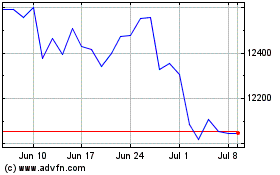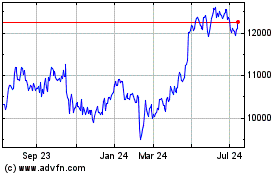TIDMAZN
RNS Number : 2850A
AstraZeneca PLC
20 January 2020
20 January 2020 07:00 GMT
Imfinzi and tremelimumab granted Orphan
Drug Designation in the US for liver cancer
AstraZeneca's Imfinzi (durvalumab) and tremelimumab, an
anti-CTLA4 antibody and potential new medicine, have both been
granted Orphan Drug Designation (ODD) in the US for the treatment
of hepatocellular carcinoma (HCC), the most common type of liver
cancer.
The US Food and Drug Administration (FDA) grants ODD to
medicines intended for the treatment, diagnosis or prevention of
rare diseases or disorders that affect fewer than 200,000 people in
the US.
Liver cancer is the third leading cause of cancer death
worldwide and for patients with unresectable or advanced disease,
only 13% are alive five years after diagnosis.(1-3)
José Baselga, Executive Vice President, Oncology R&D, said:
"Many patients with liver cancer are diagnosed and treated only
after the disease is advanced, and there is an urgent need for new
effective and tolerable treatments. We are eager to bring new
potential options to these patients and look forward to the results
of our ongoing Phase III HIMALAYA trial later this year."
The Phase III HIMALAYA trial is testing Imfinzi and the
combination of Imfinzi plus tremelimumab in patients with
unresectable, advanced HCC who have not been treated with prior
systemic therapy and are not eligible for locoregional therapy
(treatment localised to the liver). HIMALAYA is the first trial to
test dual immune checkpoint blockade in the 1st-line advanced HCC
setting.
Imfinzi is not currently approved to treat HCC in any country,
alone or in combination with tremelimumab.
Hepatocellular carcinoma (HCC)
Liver cancer is the third leading cause of cancer death and the
sixth most commonly diagnosed cancer worldwide.(1) HCC represents
about 80% of all primary liver cancers.(4) Approximately 700,000
people were diagnosed with HCC around the world in 2018, and an
estimated 42,000 people were diagnosed in the US last year.(1,2)
Between 80-90% of all patients with HCC also have chronic liver
disease, which is primarily caused by infection with the hepatitis
B or C viruses.(5,6) Chronic liver disease is associated with
inflammation that, over time, results in immunosuppression and can
lead to the development of HCC.(7,8) The unique immune environment
of liver cancer provides clear rationale for researching medicines
that harness the power of the immune system to treat HCC.(9) A
critical unmet need exists for patients with HCC who face limited
treatment options.(10) More than half of patients are diagnosed at
advanced stages of the disease, often when symptoms first
appear.(11,12)
HIMALAYA
HIMALAYA is a randomised, open-label, multicentre, global Phase
III trial of Imfinzi monotherapy and the combination of Imfinzi and
tremelimumab vs. the standard-of-care medicine sorafenib, a
multi-kinase inhibitor, in patients with unresectable, advanced HCC
who have not been treated with prior systemic therapy and are not
eligible for locoregional therapy. The trial is being conducted in
189 centres across 16 countries including in the US, Canada,
Europe, South America and Asia. The primary endpoint is overall
survival and key secondary endpoints include objective response
rate and progression-free survival.
Imfinzi
Imfinzi (durvalumab) is a human monoclonal antibody that binds
to PD-L1 and blocks the interaction of PD-L1 with PD-1 and CD80,
countering the tumour's immune-evading tactics and releasing the
inhibition of immune responses.
Imfinzi is approved in the curative-intent setting of
unresectable, Stage III non-small cell lung cancer (NSCLC) after
chemoradiation therapy in 54 countries, including the US, Japan,
China and across the EU, based on the Phase III PACIFIC trial.
Imfinzi is also approved for previously treated patients with
advanced bladder cancer in 11 countries, including the US.
Imfinzi is under Priority Review with FDA for the treatment of
patients with previously untreated extensive-stage small cell lung
cancer (SCLC) in combination with chemotherapy. A Prescription Drug
User Fee Act date is set for the first quarter of 2020.
As part of a broad development programme, Imfinzi is also being
tested as a monotherapy and in combination with tremelimumab, an
anti-CTLA4 monoclonal antibody and potential new medicine, as a
treatment for patients with NSCLC, SCLC, bladder cancer, head and
neck cancer, liver cancer, biliary tract cancer, cervical cancer
and other solid tumours.
Tremelimumab
Tremelimumab is a human monoclonal antibody and potential new
medicine that targets the activity of cytotoxic
T-lymphocyte-associated protein 4 (CTLA-4). Tremelimumab blocks the
activity of CTLA-4, contributing to T cell activation, priming the
immune response to cancer and fostering cancer cell death.
Tremelimumab is being tested in a clinical trial programme in
combination with Imfinzi in NSCLC, SCLC, bladder cancer, head and
neck cancer and liver cancer.
AstraZeneca's approach to Immuno-Oncology (IO)
Immuno-oncology (IO) is a therapeutic approach designed to
stimulate the body's immune system to attack tumours. The Company's
IO portfolio is anchored by immunotherapies that have been designed
to overcome anti-tumour immune suppression. AstraZeneca believes
that IO-based therapies offer the potential for life-changing
cancer treatments for the clear majority of patients.
The Company is pursuing a comprehensive clinical-trial programme
that includes Imfinzi as a monotherapy and in combination with
tremelimumab in multiple tumour types, stages of disease, and lines
of therapy, using the PD-L1 biomarker as a decision-making tool to
define the best potential treatment path for a patient. In
addition, the ability to combine the IO portfolio with radiation,
chemotherapy, small targeted molecules from across AstraZeneca's
Oncology pipeline, and from research partners, may provide new
treatment options across a broad range of tumours.
AstraZeneca in Oncology
AstraZeneca has a deep-rooted heritage in oncology and offers a
quickly growing portfolio of new medicines that has the potential
to transform patients' lives and the Company's future. With at
least six new medicines to be launched between 2014 and 2020, and a
broad pipeline of small molecules and biologics in development, the
Company is committed to advance oncology as a key growth driver for
AstraZeneca focused on lung, ovarian, breast and blood cancers. In
addition to AstraZeneca's main capabilities, the Company is
actively pursuing innovative partnerships and investments that
accelerate the delivery of our strategy, as illustrated by the
investment in Acerta Pharma in haematology.
By harnessing the power of four scientific platforms -
Immuno-Oncology, Tumour Drivers and Resistance, DNA Damage Response
and Antibody Drug Conjugates - and by championing the development
of personalised combinations, AstraZeneca has the vision to
redefine cancer treatment and one day eliminate cancer as a cause
of death.
AstraZeneca
AstraZeneca (LSE/STO/NYSE: AZN) is a global, science-led
biopharmaceutical company that focuses on the discovery,
development and commercialisation of prescription medicines,
primarily for the treatment of diseases in three therapy areas -
Oncology, Cardiovascular, Renal and Metabolism, and Respiratory.
AstraZeneca operates in over 100 countries and its innovative
medicines are used by millions of patients worldwide. Please visit
astrazeneca.com and follow the Company on Twitter @AstraZeneca.
Media Relations
Gonzalo Viña +44 203 749 5916
Rob Skelding Oncology +44 203 749 5821
Rebecca Einhorn Oncology +1 301 518 4122
Matt Kent BioPharmaceuticals +44 203 749 5906
Angela Fiorin BioPharmaceuticals +44 1223 344 690
Jennifer Hursit Other +44 203 749 5762
Christina Malmberg Hägerstrand Sweden +46 8 552 53 106
Michele Meixell US +1 302 885 2677
Investor Relations
Thomas Kudsk Larsen +44 203 749 5712
Henry Wheeler Oncology +44 203 749 5797
BioPharmaceuticals
Christer Gruvris (Cardiovascular, Metabolism) +44 203 749 5711
BioPharmaceuticals
Nick Stone (Renal) Environmental, Social and Governance +44 203 749 5716
BioPharmaceuticals (Respiratory)
Josie Afolabi Other medicines +44 203 749 5631
Finance
Craig Marks Fixed income +44 7881 615 764
Corporate access
Jennifer Kretzmann Retail investors +44 203 749 5824
US toll-free +1 866 381 72 77
References
1. World Health Organization. IARC Globocan 2018 World Fact Sheet. Available at http://gco.iarc.fr/today/data/factsheets/populations/900-world-fact-sheets.pdf. Accessed January 2020.
2. National Cancer Institute. Cancer Stat Facts: Liver and
Intrahepatic Bile Duct Cancer. Available at:
https://seer.cancer.gov/statfacts/html/livibd.html. Accessed
January 2020.
3. Vogel A, et al. Hepatocellular carcinoma: ESMO Clinical
Practice Guidelines for diagnosis, treatment and follow-up. Annals
of Oncology 29 (Supplement 4): iv238-iv255, 2018.
doi:10.1093/annonc/mdy308.
4. ASCO Cancer.net. ASCO Answers Liver Cancer. Available at https://www.cancer.net/sites/cancer.net/files/asco_answers_liver.pdf. Accessed January 2020.
5. Dos Santos P, et al. Incidence of hepatocellular carcinoma in
patients with chronic liver disease due to hepatitis B or C and
coinfected with the human immunodeficiency virus: a retrospective
cohort study. World J Gastroenterol. 2018 February 7; 24(5):
613-622. DOI: 10.3748/wjg.v24.i5.613.
6. Hiotis SP, et al. Hepatitis B vs. hepatitis C infection on
viral hepatitis-associated hepatocellular carcinoma. BMC
Gastroenterol 12, 64 (2012) doi:10.1186/1471-230X-12-64
7. Del Campo JA., et al. Role of inflammatory response in liver
diseases: Therapeutic strategies. World journal of hepatology.
2018; 10(1), 1-7. doi:10.4254/wjh.v10.i1.1
8. Makarova-Rusher OV, et al. The yin and yang of evasion and
immune activation in HCC. J Hepatol. 2015; 62 (6): 1420-1429.
9. Han Y, et al. Human CD141CTLA-41Regulatory Dendritic Cells
Suppress T-Cell Response by Cytotoxic
T-LymphocyteAntigen-4-Dependent IL-10 and
Indoleamine-2,3-Dioxygenase Production in Hepatocellular Carcinoma.
Hepatology. 2014 Feb; 59 (2): 567-79.
10. Bupathi M, et al. Hepatocellular carcinoma: Where there is
unmet need. Molecular oncology. 2015;9(8):1501-1509.
doi:10.1016/j.molonc.2015.06.005.
11. Colagrande S, et al. Challenges of advanced hepatocellular
carcinoma. World J Gastroenterol. 2016;22(34):7645-7659
doi:10.3748/wjg.v22.i34.7645.
12. NORD. Hepatocellular Carcinoma (HCC). Available at:
https://rarediseases.org/physician-guide/hepatocellular-carcinoma-hcc/.
Accessed January 2020.
Adrian Kemp
Company Secretary
AstraZeneca PLC
This information is provided by RNS, the news service of the
London Stock Exchange. RNS is approved by the Financial Conduct
Authority to act as a Primary Information Provider in the United
Kingdom. Terms and conditions relating to the use and distribution
of this information may apply. For further information, please
contact rns@lseg.com or visit www.rns.com.
END
MSCFIFFRLDIIFII
(END) Dow Jones Newswires
January 20, 2020 02:00 ET (07:00 GMT)
Astrazeneca (LSE:AZN)
Historical Stock Chart
From Mar 2024 to Apr 2024

Astrazeneca (LSE:AZN)
Historical Stock Chart
From Apr 2023 to Apr 2024
